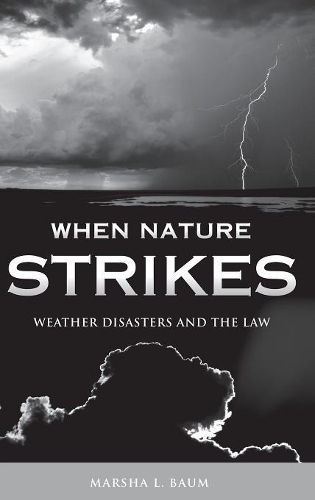
When Nature Strikes: Weather Disasters and the Law
(Hardback)
Publishing Details
When Nature Strikes: Weather Disasters and the Law
By (Author) Marsha L. Baum
Bloomsbury Publishing PLC
Praeger Publishers Inc
30th June 2007
United States
Classifications
Professional and Scholarly
Non Fiction
Aid and relief programmes
Jurisprudence and general issues
344.73053492
Winner of 2007 Atmospheric Science Librarians International Choice Book Award, Honourable 2007 (United States)
Physical Properties
Hardback
248
Description
Both law and weather affect us every day of our modern lives, yet most people do not know how the weather has affected developments in the law, nor are they aware of how the law has attempted to develop ways to affect the weather. When Nature Strikes is the first book to examine the various areas in which law and weather meet and affect each other. This one-of-a-kind work describes the law related to weather in the United States in the context of specific cases, legislation, and administrative legal action. For example, weather can be the means to commit a crime or the factor that turns an event from a terrible accident into a criminal act. Weather can be a defense against liability in both civil and criminal cases. People seek relief in court from the harm caused by weather events, whether a slip on the ice or the horrible devastation wrought by a deadly hurricane. Courts and the criminal justice system can be affected by weather events that prevent physical access to the courthouse or that destroy evidence. Through laws passed by Congress, U.S. weather services have evolved from simply weather recording into weather forecasting and warning systems. Federal patent law offers monopolies over inventions to encourage inventors to develop new devices that increase human safety in extreme weather or to improve methods such as cloud seeding or wind energy.
Reviews
Baum takes a novel approach to the topic of weather by analyzing its frequent intersections with the law. Weather affects countless court cases, legislation, and administrative law. Three particular areas of legal concern are addressed: the history and role of the US government in forecasting and issuing warnings; scientific attempts at weather control, including patents law; and liability and criminal culpability for weather-related harm. Particularly useful is a glossary of weather terms, a table of weather-related cases, and a list of federal statutes and proposed legislation. Baum explores varying questions, such as the liability of forecasters for inaccurate weather reports and the legal debate over blame for the catastrophic damage caused by Hurricane Katrina. She contends the legal system often addresses weather-related issues the same way, even though substantial evidence indicates these approaches fail. Baum argues that the government needs to develop better strategies to cope with disasters, mitigating the harm that these events cause. This is a much-needed work, considering the growing impact of weather-related disasters. Extensive notes; selected bibliography. Highly recommended. General readers; academic audiences, upper-division undergraduate and up; professionals. * Choice *
Baum examines a topic that is without any other treatment.[t]he book will be useful to scholars and instructors in the general areas of law and disasters and may also be useful for instructors looking for supplementary readings on civil liability and sovereign immunity that have a weather or disaster dimension. * Law & Politics Book Review *
Baum notes that legal issues in the future will encompass global warming law, weaponization of the weather, and medical malpractice lawsuits for failure to consider weather-sensitivity disorders. This fascinating look at the social consequences of severe weather is accompanied by a glossary of terms from acid rain to winter weather advisories. * College & Research Libraries News *
Baum (U. of New Mexico Law School, Albuquerque) presents the first book to explore various areas in which law and weather meet and affect each other. The text addresses law related to weather in the U.S. in the context of specific cases, legislation, and administrative legal action, through a sampling of cases and a select few weather events representing the 200 years of U.S. history. Baum focuses on three main areas: the history and role of the government in weather reporting, forecasting, and warning systems; human attempts to affect the weather and governmental regulation of those efforts; and liability for harm resulting from weather-related incidents that affect individuals. For meteorologists, weather historians, attorneys, and interested general readers. * Reference & Research Book News *
Author Bio
Marsha L. Baum is Professor of Law at the University of New Mexico Law School in Albuquerque, where she is former Associate Dean for Library Affairs and former Director of the Law Library.
